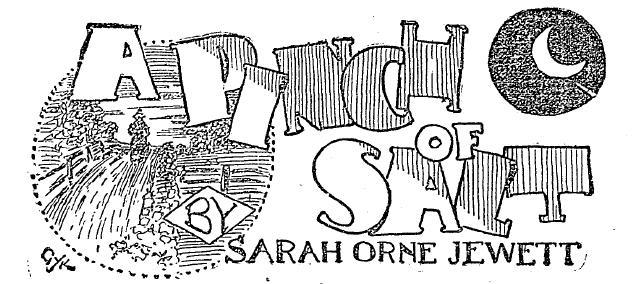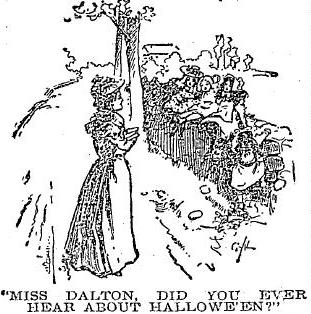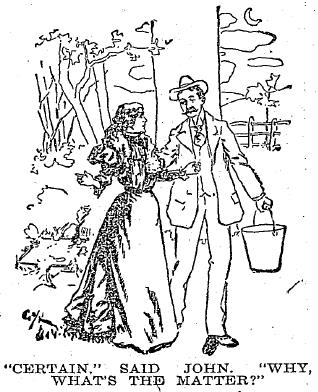Main Contents & Search
Uncollected Stories
Milwaukee Journal Text
.
Sarah Orne Jewett

Hannah Dalton was going along the road from school later than usual, because two lazy little boys were kept in to learn a spelling lesson. It was Friday night and she was tired; sometimes she was afraid that she was going to be tired of school keeping. For a good many years the fourth district of Winfield had known no other school-mistress.
Now and then as she sat in the tiny
schoolhouse facing the low, lead-colored desks where her pupils
were arranged by fours in the centre and by twos at the sides of
the room under the high windows, it seemed to her as if it were
just the same school that she had begun to teach at eighteen.
There were always some lawless Strafford children, and some
discreet little Catesbys, and at least two pretty Fishers in
clean pink aprons. There were always just so many good children
and so many difficult ones, and they always seemed to sit in the
same places. Miss Dalton had taught so long that the two
incompetent spellers who had just gone along the road like birds
out of a cage, were sons of two others who had also found
terrible difficulties in the spelling-book in her first year of
keeping school. It seemed as if she were always climbing and
never getting to the top. She had spent most of the last hour in
setting the usual copies in some new writing-books. "As
for man, his days are
as grass," was always on the first page, followed by, "Be kindly affectioned one to another,"
which had to be written in a smaller hand, and "Content with such things as ye have," and
so on all down the alphabet.

"Somehow, I never felt so discouraged before in the fall term," said the little teacher. "I always said I should stop keeping school and do something else the minute I lost heart. But I don't see how I could stop. I mustn't leave Aunt Deborah; besides I do really love school! I guess there's nothing the matter except Friday night."
But still she sighed and felt sorry as she walked along. It was three-quarters of a mile from home; just the right distance in a pleasant Indian summer day like this. She stopped a moment and looked back at the red schoolhouse higher up on the long slope of the hill. The square window-frames were painted white, and looked after her as if they were eyes.
"Oh, dear!" she said again. "I don't know what's the matter with me, but I do dread the winter! Up hill in the morning, and down hill at night. I feel as if I were tied to that poor dear schoolhouse, and wound up and ran down like the weight of a clock, to keep it running. I've never got done going to school, like all the girls and boys I went with. They're scattered round the world doing all sorts of things, and I've just always gone to school. I wonder what's become of John Brayton!"
So she thought as she came slowly down the hill, but it was not like Hannah Dalton to be so down-hearted. A flutter of Fishers' pink aprons a little way ahead at the side of the road quickened her heart again. The little Fishers were great belles, as their mother and aunt had been before them, but today they were not walking home with any of the boys; two or three of the older girls were with them, and they were all laughing and frollicking as they sat in a pretty, blooming row on the stone wall.
"Miss Dalton, Miss Dalton!" called Nelly Catesby, who was her great favorite, "did you ever hear about Halloween?"
"Why, of course I have, dear," answered Miss Dalton with an indulgent smile. There is nothing so affecting in school keeping as to watch every generation as it discovers the world for itself, originating the game of marbles, and the convenience of stilts for walking, kites to employ the idle winds, and finally, the serious and interesting concerns of love making.
"It's going to be Halloween tonight," announced Nelly Catesby, daringly, while the other girls looked a little timid, as if they were still in school. Nelly Catesby was John Brayton's niece, and Miss Dalton never could stop thinking about him, though she had not seen him for ten years.
"Is it, Nelly?" kindly inquired the teacher with so friendly a smile that one of the little Fishers took heart to answer and also ask a question.
"Yes'm," said she. "Do you know any tricks to play? We know about the apple seeds on the stove and naming them for a boy and a girl, and then if they hop away they don't care anything about each other; and about going all round the house backward with a mirror in your hand, and you'll see the one you love best looking in the glass right over your shoulder."
"Oh, dear me! I should be so frightened!" said one of the girls on the wall.
"They used to say if you ate no supper but a pinch of salt and went to a spring at midnight where three men's land came together, and took a drink, that you would either meet the one you loved best -- or dream of him, I've forgotten which." Miss Dalton blushed and looked very pretty as she spoke. The row of children looked at her eagerly with their frank, childish eyes, as if they understood.
"But I don't know where there is a spring where three men's land meet," said Nelly Catesby, with a sudden cloud of doubt shadowing her face.
"No, that's the trouble," said the teacher, who suddenly felt a little embarrassed. "And we couldn't go out alone at midnight very well." She was quite the head of the school again now and walked away with an uncomfortable sense of dignity.
It was only a little way farther to the small white house where Miss Dalton lived with her old aunt Deborah, who owned half their tiny farm and managed it with great attention and good judgment. Almost all the ready money that they had to depend upon was the thirty dollars a month that Hannah earned by school keeping, but this was sure, and they lived on such a frugal scheme with much comfort. The only trouble was that they had to hire the farm work done, and there came now and then some large and troublesome extra expense. At the end of a good many years they were neither poorer nor richer than when they started. This was life, Hannah said to herself sometimes; they ought to be thankful for so good a living, but somehow, when she was younger, she used to think that life would be larger and be different.
That afternoon as she turned in from the road, the sun was just setting and there was no face at the side window where Aunt˙Deborah usually sat and welcomed her with a smile as she came along the little footpath. Then Hannah remembered that if the day were warm enough, her old aunt planned to walk across the pastures to a cousin's on the other road and to stay over night. It was a long-promised visit, and had been much discussed, yet it was a little startling to find the house empty. Aunt Deborah usually had their supper well under way when her niece came home, at this time of year when the days were growing shorter, but the fire had gone out, and the flood of sunshine from the setting sun only made the plain little room seem lonelier. Next day, according to the plan, Hannah would walk over to the cousin's in the morning and keep her aunt company on the way home. The door key had been put into a crevice behind the step of the side door, and this betokened a definite absence.
Hannah put down her schoolbooks and the little luncheon basket and sat down in the comfortable, high-backed rocking-chair by the window. It was good, after all, to get home, and to have Friday night come; she would go to bed early and get to Cousin Dorcas Snow's in good season next day, or Aunt Deborah would be sure to grow anxious.
The teacher had been very busy that morning before she went to school. Aunt Deborah had been full of activity, and her niece smiled now to think that the old lady must already have had her great plan more definitely laid out than she was willing to confess. Perhaps this was why Hannah felt tired, and why she began to grow comfortably drowsy as she sat in the rocking-chair in the warm room and presently went to sleep. She dreamed about the children on the wall and that they each were to be married at Halloween, and all the neighborhood rose up to blame her and take away the Fourth District School from her because the little Fishers and Nelly Catesby and the rest were all so young. Then she woke with a start; the sunset was long over, the twilight was done, and the great full moon was rising and shining in at the east window full in her face.

She was broad awake and laughing in a minute. "Why, it's time I got my supper," she said, cheerfully, aloud. "What would Aunt Deborah say!"
It was light in the room and she opened the pantry door. "I won't make a fire," she thought. "I'll have some cold tea or some bread and milk," and she felt along the shelf for some matches. There was a small bowl which she believed to be the sugar bowl, and she took a little lump out and put it into her mouth.
"Oh, dear, dear!" she laughed. "Why, I've got hold of the salt!" and she hastened to light the lamp and to get a drink of water. "I don't believe I'm fit to be left alone," she thought, laughing at herself with a funny little shake of the head. "Oh, dear, there's not a bit of water here!"
The Moon was so bright that the little lamp on the table looked pale and dull. The next thing was to take the pail and go to the spring, only a little way down the field. The air was crisp and frosty, and from the high ridge one could see a great stretch of the lower country.
"I shall drink the old spring dry when I get there," said Hannah, "with all this salt in my mouth," but just as she was coming close to the bit of green bank where the spring came out, she stopped still; there was someone there before her.
Nobody in Winfield was afraid of robbers or tramps; it was the quietest and most placid of neighborhoods. The spring was on the line between their neighbor's land and theirs -- it must be old Mr. Brayton come down for a drink of water, as he often did by daylight; the spring water was so much better than the well near his house. He was very deaf, and it was no use to speak, so Hannah went on.
But it was not old, deaf Mr. Brayton; it was his son John who had been so long away.
"Why, is that you, Hannah?" he asked. "Let me have your pail." And Hannah's heart began to beat with a wild kind of joy.
"When did you get home?" she asked, "I haven't heard; I've been at school all day."
"I was just over to see you," said John, looking very big and handsome in the bright moonlight. Hannah did not like to have him carry the water; she didn't know why she was so overjoyed, but she wished to wait upon him, and to make him know how glad she was to see him. "I came near going to the old schoolhouse this afternoon," he said. "I thought 'twouldn't be wise, but you know we are almost all that's left about here of our little lot that used to go to school together!"
"I didn't know as you'd ever come back to Winfield," said Hannah.
"Oh, yes, I was always bound to come back after I'd seen enough of the world," John answered, gayly. "I lost money in Florida, but I've made some out West; you didn't know I'd turned miner, did you? I found father was getting to feel old, and was worried for a little money, so I started right home after the last letter I got. I've sold out the best chance I've ever struck for what I could get, but I've nobody to think of but myself. Now I'm here, I feel pretty well off, too, but out there in the mines all you think of is getting more. Father wouldn't hear to my paying off the mortgage at first, -- had a kind of pride about it -- but I've bought half of this big field and the west pasture of him, and told him I was going to settle down for good. We caught Lawyer Dunn driving by and he made out the paper; that's the way we hurry up business out West! I've settled a good many things since I came home this morning."
"Bought half the field?" asked Hannah, as if she were bewildered.
"Yes," answered John, "the line is going to run right over the hill from the spring back here. I told the old gentleman that I'd got to have a right to the spring; it's the best water there is in the world."
"Why, then, three owners' fields are going to meet there!" pursued Hannah, half laughing and oddly excited.
"Certain," said John. "Why, what's the matter?"
"Nothing," said Hannah; "only something the children and I were laughing about coming home from school."
"Yes, I'll come in a little while," answered John, heartily, a moment after as they reached the house. The moonlight was still in the room, and Hannah pushed away the little lamp and sat where it could not shine in her face.
She felt as if John must understand when she told him that she had got a pinch of salt instead of a lump of sugar, and that was why she went to the spring. The moment she had spoken she wished the words back, but John either had forgotten the old sign, or took no notice. He did not seem in the least to know that it was Halloween.
The next morning they walked over to Cousin Dorcas Snow's together to surprise Aunt Deborah, and to tell as much as was discreet of John's good fortune, and that he had come home to be a Winfield landowner and look after his father and mother. Aunt Deborah was assured that he meant to do his honest part about keeping up the fences next her land. Everybody liked John Brayton when he was a boy, and everybody liked him now when he came home a prosperous man to his native town.
At the end of the spring term Hannah Dalton married her old schoolmate and was happy forever after. They were not very young, but they knew the value of happiness all the better. They took a very long journey to the West to settle some business, and afterward Hannah was contented to stay at home; for one thing, she found great pleasure in helping some of the children who went to school on the hill to do their hard lessons. But when anybody spoke about signs that come true, or there was any sport going on among the young people, she always insisted that the best thing to do on Halloween was to eat a pinch of salt, and go to drink at a spring where three men's land met. Nobody knew of such a spring in Winfield, for the one Hannah had in her mind was in the middle of her own farm.
Notes
"A Pinch of Salt," distributed by the
Irving Bacheller Syndicate, appeared in the Boston Evening
Transcript (Part 2, page 14), October 30, 1897. It
also appeared in other newspapers, which have not all been
identified.
These include:
The Milwaukee Journal, 30
October 1897, p. 11.
The Spokane Spokesman-Review,
30 October 1897, p. 4.
Cecelia Alice Teal reports the story
appeared with illustrations her great-grandfather, George Young
Kauffman, who was Art Director and Illustrator for the Bacheller
Syndicate in the mid-to-late 1890s. Teal reports that
Kauffman "illustrated Stephen Crane's The Red Badge of
Courage in the original newspaper serialization of that
story. He also illustrated for Irving Bacheller and Joseph
Conrad, among others." Copies of the Milwaukee
Journal illustrations appear here, courtesy of Teal.
The story was collected in Richard Cary, Uncollected Stories
of Sarah Orne Jewett, 1971, on which this text is based.
[ Back ]
As for man, his days are as grass:
Psalms 103:15
[ Back ]
Be kindly affectioned one to
another: Romans 12:10
[ Back ]
Content with such things as ye have:
Hebrews 13:5
[ Back ]
Indian summer: warm period after
first hard frosts during autumn in North America.
[ Back ]
Edited and annotated by Terry Heller, Coe College.
Main Contents & Search
Uncollected Stories